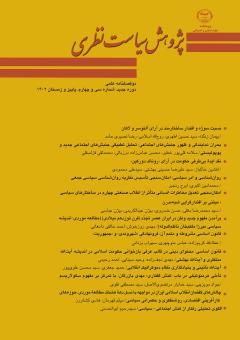برآمدن مفهوم جدید وطن در ایران عصر تجدّد (قرن نوزدهم میلادی) (مطالعه موردی: اندیشه سیاسی میرزا ملکمخان ناظمالدوله)
محورهای موضوعی : پژوهش سیاست نظریمهدی روزخوش 1 , احمد خالقی دامغانی 2
1 - دانشآموخته دکتری علوم سیاسی، دانشگاه تربیت مدرس ایران
2 - دانشیار گروه علوم سیاسی، دانشگاه تهران، ایران
کلید واژه: ترقی, وطن, دولت, ملت, تنظیمات,
چکیده مقاله :
این مقاله با هدف بررسی چگونگی تکوین مفهوم جدید وطن در اندیشۀ سیاسی یکی از مهمترین روشنفکران ایرانی قرن نوزدهم میلادی، میرزا ملکمخان ناظمالدوله به رشته تحریر درآمده است. دادهها با روش اسنادی - کتابخانهای گردآوری شده و با روش تحلیل مضمون که از روشهای کیفی شناختهشده برای تجزیه و تحلیل متون در بسیاری از پژوهشهای علوم انسانی از جمله مطالعات تاریخ اندیشه است، واکاوی شده است. اما با توجه به موضوع پژوهش، دستگاه تحلیلی کوئینتن اسکینر برای بررسی اندیشههای سیاسی که آرای اندیشمندان را در نسبت با «مسئله» دوران تاریخی واکاوی میکند، به عنوان چارچوب مفهومی انجام پژوهش انتخاب شد. این تحقیق نشان داد که مفهوم جدید وطن در ایران قرن نوزدهم در پاسخ به مسئله «ترقی» ظاهر شده است. اندیشمندان ایرانی قرن نوزدهم، تأسیس دولت- ملت مدرن را راهی برای خروج ایران از توسعهنیافتگی میدیدند و چون مفاهیم دولت، ملت و وطن (کشور) در اندیشه سیاسی جدید، مفاهیم به هم پیوسته هستند، یکی از مهمترین لوازم تأسیس دولت ملی، آن بود که تلقی از وطن به عنوان ملک مشاع ملت، جایگزین روایت سنتی از آن شود که وطن را دارایی شاه میدانست. این امر در ایران به دلیل فقدان سنتهای حقوقی پشتیبان، اهمیت دوچندان داشت. تحدید سلطنت مستقل برای تحکیم مفهوم جدید وطن، نیازمند وضع قانون بود که میرزا ملکمخان با طرح قانون تنظیماتی برای تأسیس دیوانسالاری مدرن، شالودۀ نظری آن در ایران را پی ریخت. تلاش او برای استقرار «دولت مطلقه منظم»، مبین نخستین خوانش «حقوقی» از مفهوم جدید وطن در ایران مدرن است. مفهوم «تنظیمات» در اندیشه سیاسی ملکمخان، بیش از هر مفهوم دیگری، نمودار تلاش برای بنیادگذاری این سامانه است. تأکید بر تنظیمات دستگاه دیوانی بهمثابه شرط لازم برای ترقی وطن از پیشی گرفتن دولتسازی بر ملتسازی در تکوین مفهوم نوآیین وطن توسط وی حکایت دارد.
and artificial intelligence.
The Emergence of a New Concept of Homeland in Iran during the Age of Renewal (19th Century C.E.)
(Case Study: The Political Thought of Mirza Malkam Khan Nazem al-Dowleh)
Mehdi Roozkhosh*
Ahmad Khaleghi Damghani**
This paper aims to investigate the formation of a new concept of homeland in the political thought of one of the most prominent Iranian intellectuals of the nineteenth century, Mirza Malkam Khan Nazem al-Dowleh. The data was collected through documentary and library methods, and analyzed using content analysis approach, which is a recognized qualitative method for text analysis in many humanities studies, including intellectual history studies. However, considering the research topic, the analytical framework of Quentin Skinner was selected for examining the political ideas that explore the views of intellectuals in relation to the "issue" of the historical era. This research indicated that the new concept of homeland in 19th century Iran emerged in response to the "progress" issue. Iranian intellectuals of the 19th century saw the establishment of a modern nation-state as a way for Iran to overcome underdevelopment. Since the concepts of state, nation, and homeland (country) are interconnected in the new political thought, one of the key requirements for establishing a national state was to redefine homeland as a common property of the nation, replacing the traditional narrative that considered the homeland as the property of the king. Due to the lack of supportive legal traditions in Iran, this was particularly significant. The need for laws to establish an independent sovereignty to strengthen the new concept of homeland required legislation, which Mirza Malkam Khan pursued with his proposal for regulatory laws to establish a modern bureaucracy, laying the theoretical foundation for it in Iran. His efforts to establish a "regulated absolute government" represent the first legal interpretation of the new concept of homeland in modern Iran. The concept of "regulations" in Malkam Khan's political thought, more than any other concept, illustrates the endeavor to establish this system. Emphasizing the organization of the bureaucratic system as a necessary condition for advancing the homeland over prioritizing nation-building in the formation of the modern concept of homeland by him signifies his commitment to progress in the state-building process.
Keywords: Progress, Homeland, State, Nation, Regulations.
* Corresponding Author: Ph.D in Political Science, Tarbiat Modares University of Iran.
roozkhosh.mehdi@gmail.com
** Associate Professor, Department of Political Science, University of Tehran, Iran. drkhaleghi@ut.ac.ir
